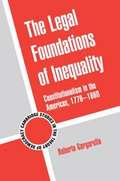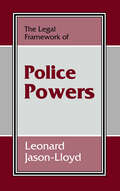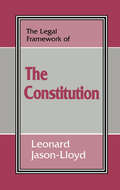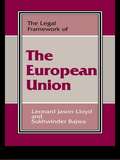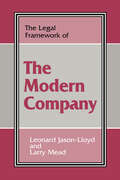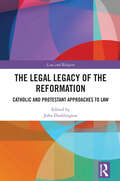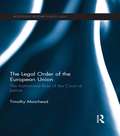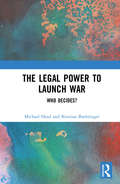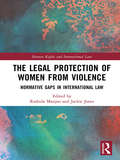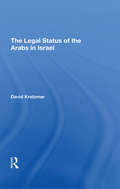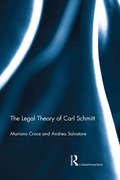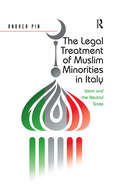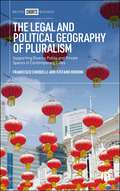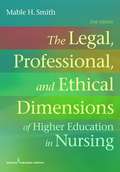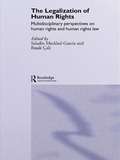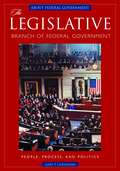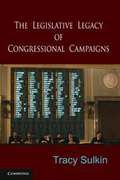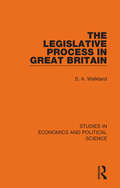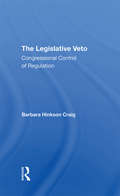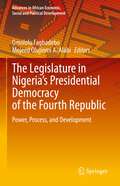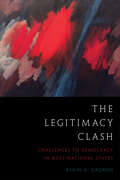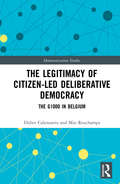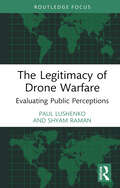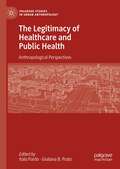- Table View
- List View
The Legal Foundations of Inequality
by Roberto GargarellaThe long revolutionary movements that gave birth to constitutional democracies in the Americas were founded on egalitarian constitutional ideals. They claimed that all men were created equal with similar capacities and also that the community should become self-governing. Following the first constitutional debates that took place in the region, these promising egalitarian claims, which gave legitimacy to the revolutions, soon fell out of favor. Advocates of a conservative order challenged both ideals and favored constitutions that established religion and created an exclusionary political structure. Liberals proposed constitutions that protected individual autonomy and rights but established severe restrictions on the principle of majority rule. Radicals favored an openly majoritarian constitutional organization that, according to many, directly threatened the protection of individual rights. This book examines the influence of these opposite views during the 'founding period' of constitutionalism in countries including the United States, Argentina, Colombia, Chile, Ecuador, Mexico, Peru, and Venezuela.
The Legal Framework of Police Powers
by Leonard Jason-LloydThe study of police powers forms a significant part of many law courses. This book should prove helpful to a wide readership, including new members of the police service, and those studying civil liberties and constitutional law.
The Legal Framework of the Constitution (Legal Framework Ser. #No. 18.)
by Leonard Jason-LloydThe law relating to the British constitution is both complex and far-reaching, with future reforms having an increasing effect on every person living in Britain. This book aims to promote better understanding of a complex subject and to cover administrative law and judicial review.
The Legal Framework of the European Union (The\legal Framework Ser.)
by Leonard Jason-Lloyd Sukhwinder BajwaThe law of the European Union continues to increase in complexity, importance and momentum, and is having an increasing effect on the lives of every person living in Britain. This book provides a focus on EC Law.
The Legal Framework of the Modern Company
by Leonard Jason-Lloyd Larry MeadThere has been a substantial growth in the application of company law, partly due to the prevailing economic and general business environment. This book examines issues such as company securities, capital and insider dealing.
The Legal Legacy of the Reformation: Catholic and Protestant Approaches to Law (Law and Religion)
by John DuddingtonThe growing interest in the relationship between religion and law is, in the case of Christianity, often viewed in monolithic terms. Moreover, the debate is often seen in terms of the relationship of Christianity to the state along with discussions about, for example, religious freedom. Christianity is often seen as responding to claims made on it by the state and by the growth of secularism.This book takes a different approach. First, it makes the claim that Christianity has something of value to say about various pressing issues which are of direct relevance to contemporary society. Amongst these are the place of human rights and that of individual claims of conscience. Second, it does not regard Christianity as a monolithic whole but takes as its starting point the sundering of Christendom at the Reformation, which, it claims, led in many cases to divergent patterns of thought between Catholics and Protestants about law and its place in society. However, as this book shows, in many cases, Catholic and Protestant thinking on areas such as natural law is not as divergent as it is often thought.Five hundred years after the Reformation, the work presents a reflection on the roots of Catholic and Protestant thinking on law and its place in society. It will be of interest to canon lawyers as well as academics and students of law and religion.
The Legal Order of the European Union: The Institutional Role of the Court of Justice (Routledge Research in EU Law)
by Timothy MoorheadThe objective of European integration serves as an ideal of the legal order of the European Union and invites reconsideration of law’s conceptual features. This book critically assesses the legal order of the European Union, focusing on the operative aspects of the Union constitution with particular reference to the institutional practices of the Court of Justice in expressing the values underlying this constitution. Drawing together positivist and non-positivist accounts within an institutional understanding of law, Timothy Moorhead breaks new ground in applying a range of analytic jurisprudential perspectives to the Union legal order, and in employing the theoretical resources provided by the Union to model a revised conceptual viewpoint concerning legal order generally. In offering this conceptual approach, Moorhead emphasises the flexibility inherent in law’s institutional character as the basis for a theoretical rationalisation of the Union legal order. This book will be of great use and interest to scholars and students of European Union Law, Jurisprudence and European Constitutionalism.
The Legal Power to Launch War: Who Decides?
by Michael Head Kristian BoehringerThe issue of who has the power to declare war or authorise military action in a democracy has become a major legal and political issue, internationally, and is set to become even more pertinent in the immediate future, particularly in the wake of military action in Syria, ongoing wars in the Middle East, and tense discussions between the United States and its allies, and Russia and China. This book comparatively examines the executive and prerogative powers to declare war or launch military action, focusing primarily on the United States, Britain and Australia. It explores key legal and constitutional questions, including: who currently has the power/authority to declare war? who currently has the power to launch military action without formally declaring war? how, if at all, can those powers be controlled, legally or politically? what are the domestic legal consequences of going to war? In addition to probing the extensive domestic legal consequences of going to war, the book also reviews various proposals that have been advanced for interrogating the power to commence armed conflict, and explores the reasons why these propositions have failed to win support within the political establishment.
The Legal Protection of Women From Violence: Normative Gaps in International Law (Human Rights and International Law)
by Jackie Jones Rashida ManjooViolence against women remains one of the most pervasive human rights violations in the world today, and it permeates every society, at every level. Such violence is considered a systemic, widespread and pervasive human rights violation, experienced largely by women because they are women. Yet at the international level, there is a gap in the legal protection of women from violence. There is currently no binding international convention that explicitly prohibits such violence; or calls for its elimination; or, mandates the criminalisation of all forms of violence against women. This book critically analyses the treatment of violence against women in the United Nations system, and in three regional human rights systems. Each chapter explores the advantages and disadvantages coming from the legal instruments, the work of the monitoring systems, and the resulting findings and jurisprudence. The book proposes that the gap needs to be addressed through a new United Nations Convention on the Elimination of All Forms of Violence against Women, or alternatively an Optional Protocol to the Convention on the Elimination of all Forms of Discrimination against Women. A new Convention or Optional Protocol would be part of the transformative agenda that is needed to normatively address the promotion of a life free of violence for women, the responsibility of states to act with due diligence in the elimination of all forms of violence against all women, and the systemic challenges that are the causes and consequences of such violence.
The Legal Status Of The Arabs In Israel
by David KretzmerThis study examines how the Israeli legal system copes with two major issues. The first is the tension between the constitutional definition of Israel as both a Jewish state and a democracy committed to equal rights for all of its citizens. The second issue is the delicate position of a national minority in a state that since its establishment has been involved in a bitter conflict with the Palestinian nation to which that minority belongs.
The Legal Texts: The Results of the Uruguay Round of Multilateral Trade Negotiations
by World Trade OrganizationThe Agreements negotiated in the Uruguay Round, which form the legal framework of the World Trade Organization, will govern world trade into the twenty-first century. This volume covers: • Goods: the updated General Agreement on Tariffs and Trade (GATT) that includes new rules on agriculture, textiles, anti-dumping, subsidies and countervailing measures, import licensing, rules of origin, standards, and pre-shipment inspection. (The original 1947 GATT text is also included in this volume. ) • Services: the General Agreement on Trade in Services (GATS) • Intellectual Property: the Agreement on Trade-Related aspects of Intellectual Property Rights (TRIPS) • Disputes: the new procedures for dispute settlement • The legal framework for the World Trade Organization This is the definitive reference for all practising and academic trade lawyers. It is an essential addition to all international law libraries, a vital source book for students taking courses on international economic or trade law and an important resource for economists and political scientists.
The Legal Theory of Carl Schmitt
by Mariano Croce Andrea SalvatoreThe Legal Theory of Carl Schmitt provides a detailed analysis of Schmitt’s institutional theory of law, mainly developed in the books published between the end of the 1920s and the beginning of the 1930s. By reading Schmitt’s overall work through the lens of his institutional turn, the authors offer a strikingly different interpretation of Schmitt’s theory of politics, law and the relation between these two domains. The book argues that Schmitt’s adhesion to legal institutionalism was a key theoretical achievement, based on serious reconsideration of the main flaws of his own decisionist paradigm, in the light of the French and Italian institutional theories of law. In so doing, the authors elucidate how Schmitt was able to unravel many of the impasses that affected his previous conceptual framework. The authors also make comparisons between Schmitt and other leading legal theorists (H. Kelsen, M. Hauriou, S. Romano and C. Mortati) and explain why the current legal debate should take into serious account his legacy.
The Legal Treatment of Muslim Minorities in Italy: Islam and the Neutral State
by Andrea PinIslam is a growing presence practically everywhere in Europe. In Italy, however, Islam has met a unique model of state neutrality, religious freedom and church and state collaboration. This book gives a detailed description of the legal treatment of Muslims in Italy, contrasting it with other European states and jurisprudence, and with wider global tendencies that characterize the treatment of Islam. Through focusing on a series of case studies, the author argues that the relationship between church and state in Italy, and more broadly in Europe, should be reconsidered both to secure religious freedom and general welfare. Working on the concepts of religious freedom, state neutrality, and relationship between church and state, Andrea Pin develops a theoretical framework that combines the state level with the supranational level in the form of the European Convention of Human Rights, which ultimately shapes a unitary but flexible understanding of pluralism. This approach should better accommodate not just Muslims' needs, but religious needs in general in Italy and elsewhere.
The Legal and Political Geography of Pluralism: Supporting Diverse Public and Private Spaces in Contemporary Cities
by Francesco Chiodelli Stefano MoroniIs it legitimate to prohibit political activities in a shopping centre, or the wearing of the full Islamic veil in a public space? This book addresses such questions of pluralism in a time of increasing ethnic, religious and cultural diversity in the public and private spaces of our cities. Analysing different types of regulation — property rights, municipal ordinances and urban planning — the authors reflect on the kinds of rules public institutions should accept in relation to private spaces, and should promote in relation to public spaces, in order to protect and support pluralism.
The Legal, Professional, and Ethical Dimensions of Higher Education In Nursing
by Mable H. SmithThe only volume on higher education law written specifically for nursing faculty, this volume imparts the basic foundations of the legal, professional, and ethical issues that concern faculty on a daily basis. It clearly defines the legal rights of students, professors, and educational institutions along with the case laws supporting those rights. Each chapter contains a vivid legal scenario, related legal principles and theoretical foundations, and critical thinking questions. Written by an author who is both a nurse educator and attorney, the volume emphasizes sound decision making so that readers can successfully navigate the complex legal issues confronting them in the faculty role.
The Legalization of Human Rights: Multidisciplinary Perspectives on Human Rights and Human Rights Law
by Saladin Meckled-García Başak ÇaliThe concept of 'human rights' as a universal goal is at the centre of the international stage. It is now a key part in discourse, treaties and in domestic jurisdictions. However, as this study shows, the debate around this development is actually about human rights law. This text scrutinizes the extent to which legalization shapes the human rights ideal, and surveys its ethical, political and practical repercussions. How does the law influence what we think about rights? What more is there to such rights than their legal protection? These expert contributors approach these questions from a range of perspectives: political theory/moral theory, anthropology, sociology, international law, international politics and political science, to deliver a diversity of methodologies. This book is essential reading for those wishing to develop a clear understanding of the relationship between human rights ideals and laws and for those working toward the fostering of a genuine human rights culture.
The Legislative Branch of Federal Government: People, Process, and Politics
by Gary P. GershmanPart of ABC-Clio's About Federal Government series, this book by Gershman (history and legal studies, Nova Southeastern U.) introduces the history and current realities of the US Congress to a general readership. He offers chapters on US constitutional history as it pertains to Congress; the evolving roles, functions, and powers of the legislative branch; Congressional structures and processes; leadership roles and significant individual legislators; historical and contemporary politics of the legislature; and interactions with other branches. He also offers 230 pages of historical documents, including major pieces of legislation, Supreme Court cases, and articles of impeachment. Additionally, a glossary of concepts and people and an annotated bibliography are included
The Legislative Legacy of Congressional Campaigns
by Tracy SulkinDo members of Congress follow through on the appeals they make in campaigns? The answer to this question lies at the heart of assessments of democratic legitimacy. This study demonstrates that, contrary to the conventional wisdom that candidates' appeals are just 'cheap talk', campaigns actually have a lasting legacy in the content of representatives' and senators' behavior in office. Levels of promise-keeping vary in a systematic fashion across legislators, across types of activity, across time and across chamber. Moreover, legislators' responsiveness to their appeals shapes their future electoral fortunes and career choices, and their activity on their campaign themes leaves a tangible trace in public policy outputs. Understanding the dynamics of promise-keeping thus has important implications for our evaluations of the quality of campaigns and the strength of representation in the United States.
The Legislative Process in Great Britain (Studies in Economics and Political Science)
by S. A. WalklandOriginally published in 1968, this book deals with the process of public legislation in modern Britain at the time, not in terms of constitutional formulae, but by a realistic appraisal of the relationships between the political institutions and forces which gave the process its shape. It concentrates particularly on the procedures and conventions which operated at the preparatory stages of legislation, and established that legislation was almost exclusively a governmental function, Parliament playing only a minor role. It is particularly concerned to stress the extent to which consultation by the government with pressure groups was now a major feature of the legislative process, and concludes that subordinate departmental legislation, developed as a result of collaboration between pressure groups and Civil Servants, was the most characteristic and important stage of the legislative process in Britain. The book brought together the conclusions of recent scholarship in this field, and the result is a balanced perspective of an important decision-making process of British government at the time. Today it can be read in its historical context.
The Legislative Veto: Congressional Control Of Regulation
by Barbara CraigOn June 23, 1983, the U.S. Supreme Court declared a legislative veto unconstitutional in the Immigration and Naturalization Service v. Chadha case, a ruling that seems to invalidate the legislative vetoes in more than two hundred laws. Two weeks later the court reaffirmed the principles of Chadha to invalidate the legislative veto in other acts. These epic cases, which are already being called the most important separation-of-powers rulings since the White House tapes cases, have generated debate over the implications of the loss of the legislative veto and the wisdom of the court's actions. In this book the author argues that the legislative veto fell far short of its promise in actual operation over the regulatory process. Instead of promoting democratic congressional control over the actions of bureaucrats, legislative veto politics more often devolved to the politics of special interest protection, heavily influenced by unelected congressional staff. Moreover, the legislative veto. allowed Congress to sidestep conflicts by issuing vague mandates that left agencies without the necessary congressional support to implement them. Dr. Craig combines a historical perspective on the legislative veto with analyses of original case studies involving some of the most important policy issues of the 1980s--housing, education, energy, and consumer protection. Assessing all the cases available for research, she points to discrepancies between the legislative veto's intended effects and its actual results. In a final chapter she considers the impact of the Chadha case and discusses possible alternatives to the legislative veto for congressional control of regulation.
The Legislature in Nigeria’s Presidential Democracy of the Fourth Republic: Power, Process, and Development (Advances in African Economic, Social and Political Development)
by Omololu Fagbadebo Mojeed Olujinmi A. AlabiThis book investigates whether legislative institutions, state and national, in Nigeria’s Fourth Republic have been able to harness constitutional powers to impact public policy. Presenting how the Nigerian state has not been able to showcase the expected dividends of presidential democracy since 1999, it analyzes the crisis of governance and its impact on political stability, social cohesion, and the livelihood of citizens. The book further discusses the depreciating infrastructure, corruption, and mismanagement of public resources, and shows how defiant attitudes of public political and bureaucratic officials define the new wave of corruption and profligacy in Nigeria, presenting this development as a result of a weakened legislature. The book displays the necessity of implementing a culture of accountability and discusses oversight mechanisms to make the executive accountable. These mechanisms are designed to ensure effective public service delivery. Finally, the book situates the legislative institutions in Nigeria within the context of the contributions of the National Assembly and the Assemblies of the State Houses to the development of this emerging democracy in Africa. The book will appeal to students and scholars of political science and public administration, as well as policy-makers and practitioners interested in a better understanding of democracy, separation of powers, governance, and Nigerian politics.
The Legitimacy Clash: Challenges to Democracy in Multinational States
by Alain-G GagnonIn the coming decade, we may see the advent of multinational federalism on an international scale. As great powers and international organizations become increasingly uncomfortable with the creation of new states, multinational federalism is now an important avenue to explore, and in recent decades, the experiences of Canada and Quebec have had a key influence on the approaches taken to manage national and community diversity around the world. Drawing on comparative scholarship and several key case studies (including Scotland and the United Kingdom, Catalonia and Spain, and the Quebec-Canada dynamic, along with relations between Indigenous peoples and various levels of government), The Legitimacy Clash takes a fresh look at the relationship between majorities and minorities while exploring theoretical advances in both federal studies and contemporary nationalisms. Alain-G. Gagnon critically examines the prospects and potential for a multinational federal state, specifically for nations seeking affirmation in a hostile context. The Legitimacy Clash reflects on the importance of legitimacy over legality in assessing the conflicts of claims.
The Legitimacy of Citizen-led Deliberative Democracy: The G1000 in Belgium (Democratization Studies)
by Didier Caluwaerts Min ReuchampsFor deliberative democrats, the strength of any democracy is public deliberation, the frequent and reasoned discussion between citizens on political issues. Despite all the theoretical claims made about deliberative systems, the question remains how to empirically assess both the legitimacy and function of deliberative systems in the real world and how individual sites of deliberation interact within the larger political system. In other words, what is the legitimacy of each individual component and under which conditions can these components improve the legitimacy of the wider system? These are the central research questions for this book looking particularly through the prism of the citizen-led mini-public G1000 in Belgium, which grew out of a feeling of deep democratic crisis. Offering empirically measurable translations of philosophical concepts, the book enhances our understanding of how political systems function, and of the viability of a deliberative democracy at a larger scale. Finally, it provokes fundamental normative questions on how we want to shape our society, especially divided ones. This text will be of key interest to scholars, students and practitioners of deliberative democracy, and to those interested in democratic theory and more broadly political science, communication, sociology, and philosophy.
The Legitimacy of Drone Warfare: Evaluating Public Perceptions
by Paul Lushenko Shyam RamanThis book examines public perceptions of the legitimacy of drones, and how this affects countries’ policies on and the global governance of drone warfare.Scholars recognize that legitimacy is central to countries’ use of drones, and political officials often characterize strikes as legitimate to sustain their use abroad. This book introduces and tests an original middle-range theory that allows scholars, policy-makers, and practitioners to understand how evolving patterns of drone warfare globally shape the public’s perceptions of legitimacy that can moderate countries’ drone policies and the global governance of drones. Rather than relate drone warfare to a platform or counterterrorism strikes only, as experts often do, this book argues that drone warfare is best understood as a function of the unique ways that countries use and constrain strikes. By updating theories of drone warfare, this book provides a generalizable way to understand public perceptions of legitimacy in cross-national contexts, especially among democratic political regimes that are prefigured on political officials’ accountability for the use of force abroad.This book will be of interest to students of security studies, foreign policy, media and communication studies, and International Relations.
The Legitimacy of Healthcare and Public Health: Anthropological Perspectives (Palgrave Studies in Urban Anthropology)
by Italo Pardo Giuliana B. PratoThe complex, highly problematic, often thorny dynamics of trust and authority are central to the anthropological study of legitimacy. In this book, this sine qua non runs across the in-depth examination of the ways in which healthcare and public health are managed by the authorities and experienced by the people on the ground in urban Europe, the USA, India, Africa, Latin America and the Far and Middle East. This book brings comparatively together anthropological studies on healthcare and public health rigorously based on in-depth empirical knowledge. Inspired by the current debate on legitimacy, legitimation and de-legitimation, the contributions do not refrain from taking into account the impact of the Covid-19 pandemic on the health systems under study, but carefully avoid letting this issue monopolise the discussion. This book raises key challenges to our understanding of healthcare practices and the governance of public health. With a keen eye on urban life, its inequalities and the ever-expanding gap between rulers and the ruled, the findings address important questions on the complex ways in which authorities gain, keep, or lose the public’s trust.
